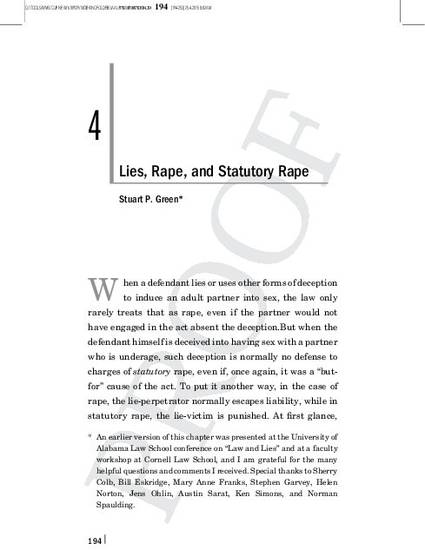
Contribution to Book
Lies, Rape, and Statutory Rape
Law and Lies: Deception and Truth-Telling in the American Legal System Cambridge U. Press, 2015)
(2015)
Abstract
When an offender lies or uses other forms of deception to induce an adult victim into sex, the law normally does not treat that as rape, even when the victim would not have engaged in the act absent the deception. But when the offender himself is deceived into having sex with an underage victim, that is treated as statutory rape, even if, once again, the deception was a but-for cause of the sex. To put it another way, in the case of rape, the person who does the lying escapes liability, while in the case of statutory rape the person who is lied to is punished. At first glance, this seems reversed: why should lie-perpetrators go free while lie-victims are punished? Can such a regime be justified?
I will argue that the best way to understand the function of both rape and statutory rape is as part of a larger body of sexual offense laws. Under this approach, sexual autonomy is not a single, monolithic right to sexual self-determination, as some have described it, but, rather, a complex, multifarious “bundle” of rights to engage in, or refrain from, various forms of sexual activity and sex-related conduct; and different sexual offenses should be understood as protecting different “sticks” within the bundle. Rape, under my approach, would protect the basic right to decide whether to have penetrative sex, and with whom. Only misrepresentations regarding the fact of sexual penetration or the identity of one’s partner would be sufficient to invalidate consent for purposes of rape law. Misrepresentations regarding other matters, such as the fact that one’s partner is not using contraception, has a sexually-transmitted disease, or is transgendered, should be dealt with, if at all, by more specialized, lesser offenses within the suite of sexual offenses.
Statutory rape should also be viewed within the broader scope of the sexual offenses. It is often said that a child’s lack of consent should be “presumed” whenever the child has sex with an adult. But if children were truly incapable of consenting to sex, it would make no sense to treat the forcible rape of a child as a more serious offense. We are thus presented with something of a paradox: when a child is subject to genuinely unwanted sex, the presumption is that she is capable of consenting to sex; but when she is involved in wanted sex, the law presumes that she is incapable of consenting. To avoid this paradox, we should abandon the concept of statutory rape as involving a presumption of nonconsent, and instead simply view it as analogous to other sexual offenses that are intended to prevent the exploitation of potentially vulnerable members of society. Under this approach, we would understand statutory rape law as protecting only those children who are too young or inexperienced or immature to make the decision to have sex. In cases where a precocious teen misrepresents her age to an adult, the rationale for imposing liability is lacking.
Disciplines
Publication Date
2015
Editor
Austin Sarat (ed.)
Publisher
Cambridge U. Press
Citation Information
Stuart Green. "Lies, Rape, and Statutory Rape" Law and Lies: Deception and Truth-Telling in the American Legal System Cambridge U. Press, 2015) (2015) Available at: http://works.bepress.com/stuart_green/6/
